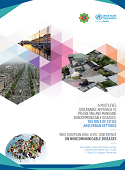A multilevel governance approach to preventing and managing noncommunicable diseases: the role of cities and urban settings (2019)

Download
- Urbanization is one of the leading global trends of the 21st century, and has a significant impact on health and well-being, particularly in relation to noncommunicable diseases (NCDs). The factors influencing urban health include urban governance, population characteristics, the natural and built environment, social and economic development, services and health emergency management, and food security.
- With over half of the world’s population now living in urban settings, cities, municipal governments and urban places are uniquely placed to transform the fight against NCDs and injuries.
- A multilevel governance approach is necessary effectively to manage and tackle NCDs, with cites operating within an enabling national framework and with coherence between the different levels of governance.



